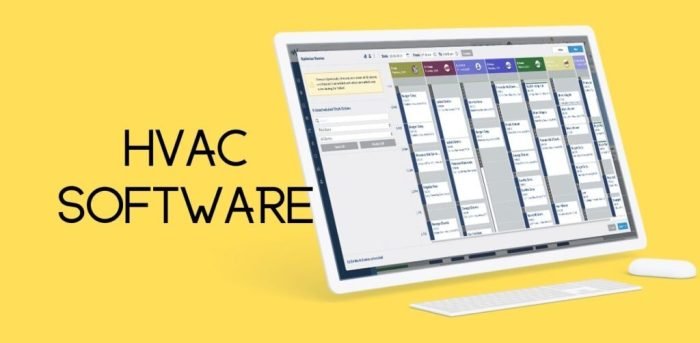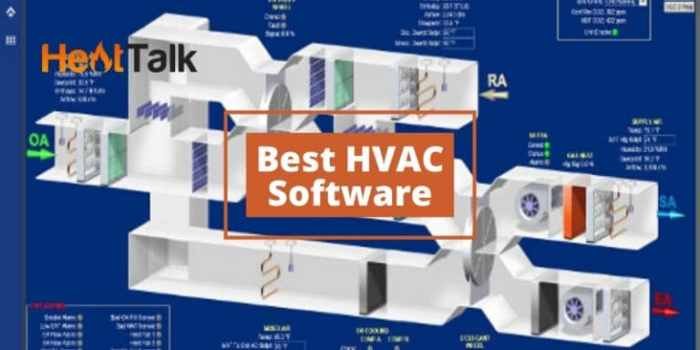In the realm of home comfort and efficiency, HVAC systems play a pivotal role. As homeowners, we constantly seek ways to optimize our heating, ventilation, and air conditioning (HVAC) systems for maximum performance and cost-effectiveness. Enter HVAC software for home use – a revolutionary tool that empowers homeowners with unprecedented control over their indoor climate.
HVAC software offers a comprehensive suite of features designed to simplify system management, enhance comfort, and reduce energy consumption. By leveraging advanced algorithms and user-friendly interfaces, these software solutions provide homeowners with the ability to monitor, adjust, and optimize their HVAC systems remotely, ensuring optimal performance and energy efficiency.
Introduction
HVAC software for home use is a digital tool that assists homeowners in managing and optimizing their heating, ventilation, and air conditioning (HVAC) systems. It provides user-friendly interfaces, data analytics, and automation features to enhance comfort, energy efficiency, and system maintenance.
Using HVAC software for home use offers numerous benefits, including:
- Improved Comfort: By monitoring temperature and humidity levels, homeowners can adjust their HVAC systems to create a more comfortable living environment.
- Increased Energy Efficiency: Software analyzes system performance and suggests adjustments to reduce energy consumption and lower utility bills.
- Simplified Maintenance: Automated alerts and reminders help homeowners stay on top of maintenance tasks, preventing costly breakdowns.
- Enhanced Diagnostics: Software can identify potential issues and provide troubleshooting guidance, allowing homeowners to resolve minor problems before they escalate.
Types of HVAC Software for Home Use
Homeowners who want to keep their HVAC systems running smoothly can benefit from using HVAC software. This software can help you monitor your system, identify potential problems, and make informed decisions about repairs and maintenance.
There are a number of different types of HVAC software available for home use, each with its own features and benefits.
Monitoring Software
Monitoring software allows you to track the performance of your HVAC system in real time. This can help you identify potential problems early on, before they become major issues.
- Monitor temperature and humidity levels
- Track energy consumption
- Receive alerts if there are any problems
Diagnostic Software
Diagnostic software can help you identify the cause of problems with your HVAC system. This can save you time and money by avoiding unnecessary repairs.
- Troubleshoot common HVAC problems
- Identify the source of strange noises
- Provide recommendations for repairs
Maintenance Software
Maintenance software can help you keep your HVAC system running smoothly by providing reminders for regular maintenance tasks. This can help you avoid costly repairs and extend the life of your system.
- Schedule maintenance appointments
- Track maintenance history
- Provide tips for DIY maintenance
3. Features to Consider When Choosing HVAC Software for Home Use
Choosing the right HVAC software for home use requires careful consideration of various features. These features can greatly enhance the functionality and user experience of the software, making it more effective for managing your home’s HVAC system.
When selecting HVAC software, consider the following key features:
User Interface
- Ease of use: The software should be intuitive and easy to navigate, even for users with limited technical knowledge.
- Customizable dashboard: The ability to personalize the dashboard with frequently used features and widgets enhances convenience.
- Mobile compatibility: Access to the software on smartphones or tablets allows for remote monitoring and control.
HVAC System Monitoring
- Real-time data: Access to real-time data on temperature, humidity, and other system parameters provides insights into the system’s performance.
- Historical data: Tracking and analyzing historical data helps identify trends and potential issues.
- Notifications and alerts: Customizable alerts notify users of system malfunctions, maintenance needs, or other important events.
Scheduling and Automation
- Scheduling: The ability to schedule system operation, such as turning on or off at specific times, optimizes energy consumption.
- Automation: Automated actions, such as adjusting temperatures based on occupancy or weather conditions, enhance convenience and efficiency.
- Integration with smart devices: Compatibility with smart thermostats and other IoT devices allows for centralized control and optimization.
Energy Management
- Energy usage tracking: Monitoring energy consumption helps identify areas for improvement and reduce utility bills.
- Energy-saving recommendations: The software can provide personalized recommendations for optimizing energy usage based on system data and usage patterns.
- Integration with energy providers: Compatibility with energy providers enables access to time-of-use rates and other utility programs.
Maintenance and Troubleshooting
- Maintenance reminders: The software can send reminders for regular maintenance tasks, such as filter changes and system inspections.
- Troubleshooting guides: Built-in troubleshooting guides provide step-by-step instructions for resolving common issues.
- Remote diagnostics: Some software allows for remote diagnostics by HVAC professionals, reducing the need for in-person visits.
How to Choose the Right HVAC Software for Home Use

Choosing the right HVAC software for home use can be a daunting task, but it’s important to take the time to find the software that best meets your needs. Here’s a step-by-step guide to help you choose the right HVAC software for your home:
- 1.
- *Start by determining your needs. What do you need the software to do? Are you looking for a simple program that can help you troubleshoot problems, or do you need a more comprehensive program that can help you design and install a new HVAC system?
- 2.
- *Do your research. There are a number of different HVAC software programs available, so it’s important to do your research and compare different options. Read reviews, talk to other homeowners, and visit the websites of different software providers.
- 3.
- *Consider your budget. HVAC software can range in price from free to several thousand dollars. It’s important to set a budget before you start shopping so that you don’t overspend.
- 4.
- *Compare features. Once you’ve narrowed down your options, it’s time to compare features. Consider the features that are most important to you, and make sure that the software you choose has those features.
- 5.
- *Read the reviews. Before you purchase any software, it’s important to read the reviews. This will give you a good idea of what other users think of the software and whether or not it’s right for you.
- 6.
- *Download a trial version. If you’re still not sure which software to choose, download a trial version and try it out for yourself. This will give you a chance to see how the software works and whether or not it’s right for you.
By following these steps, you can choose the right HVAC software for your home and make sure that your HVAC system is running smoothly and efficiently.
Benefits of Using HVAC Software for Home Use

HVAC software can provide homeowners with a number of benefits, including:
Saving money: HVAC software can help homeowners save money on their energy bills by optimizing the performance of their HVAC systems. The software can track the system’s performance and identify areas where it can be improved. By making these improvements, homeowners can reduce their energy consumption and lower their bills.
Improving comfort: HVAC software can also help homeowners improve their comfort by ensuring that their homes are at the right temperature. The software can track the temperature in the home and adjust the HVAC system accordingly. This can help to eliminate hot and cold spots and create a more comfortable living environment.
Extending the life of the HVAC system: HVAC software can also help to extend the life of the HVAC system by identifying and preventing problems. The software can track the system’s performance and identify any potential issues. By addressing these issues early on, homeowners can prevent them from becoming major problems that could lead to costly repairs or replacements.
Examples of how HVAC software can help homeowners save money and improve their comfort
Here are some specific examples of how HVAC software can help homeowners save money and improve their comfort:
- HVAC software can help homeowners identify and fix problems with their HVAC systems. For example, the software can identify if the system is not properly sized for the home, or if there are any leaks in the ductwork. By fixing these problems, homeowners can improve the efficiency of their HVAC system and save money on their energy bills.
- HVAC software can help homeowners optimize the settings of their HVAC systems. For example, the software can help homeowners determine the ideal temperature for their home, and can automatically adjust the system to maintain that temperature. By optimizing the settings of their HVAC system, homeowners can improve their comfort and save money on their energy bills.
- HVAC software can help homeowners monitor the performance of their HVAC systems. For example, the software can track the system’s energy consumption and identify any trends. By monitoring the performance of their HVAC system, homeowners can identify any potential problems and take steps to address them before they become major issues.
Conclusion
This article has provided a comprehensive overview of HVAC software for home use, including the types available, features to consider, and how to choose the right one. By utilizing HVAC software, homeowners can gain numerous benefits, such as improved comfort, energy savings, and reduced maintenance costs.
With the information presented here, readers are well-equipped to make an informed decision when selecting HVAC software for their home.
To take the next step towards optimizing your home’s HVAC system, we encourage you to explore the available software options and consider the factors discussed in this article. By implementing HVAC software, you can unlock a world of benefits and enjoy a more comfortable, energy-efficient, and cost-effective home environment.
Final Conclusion
Embracing HVAC software for home use is a transformative step towards achieving a comfortable and energy-efficient living environment. With its ability to streamline system management, enhance comfort levels, and reduce energy consumption, HVAC software empowers homeowners to take control of their indoor climate and create a haven of comfort and savings.
Helpful Answers
What types of HVAC software are available for home use?
There are various types of HVAC software for home use, including basic monitoring and control software, advanced energy management software, and comprehensive system diagnostic software.
How can HVAC software help me save money?
HVAC software can help you save money by optimizing system performance, reducing energy consumption, and identifying potential problems before they become costly repairs.
Is HVAC software easy to use?
Most HVAC software for home use is designed with user-friendly interfaces and intuitive navigation, making them accessible to homeowners of all technical abilities.